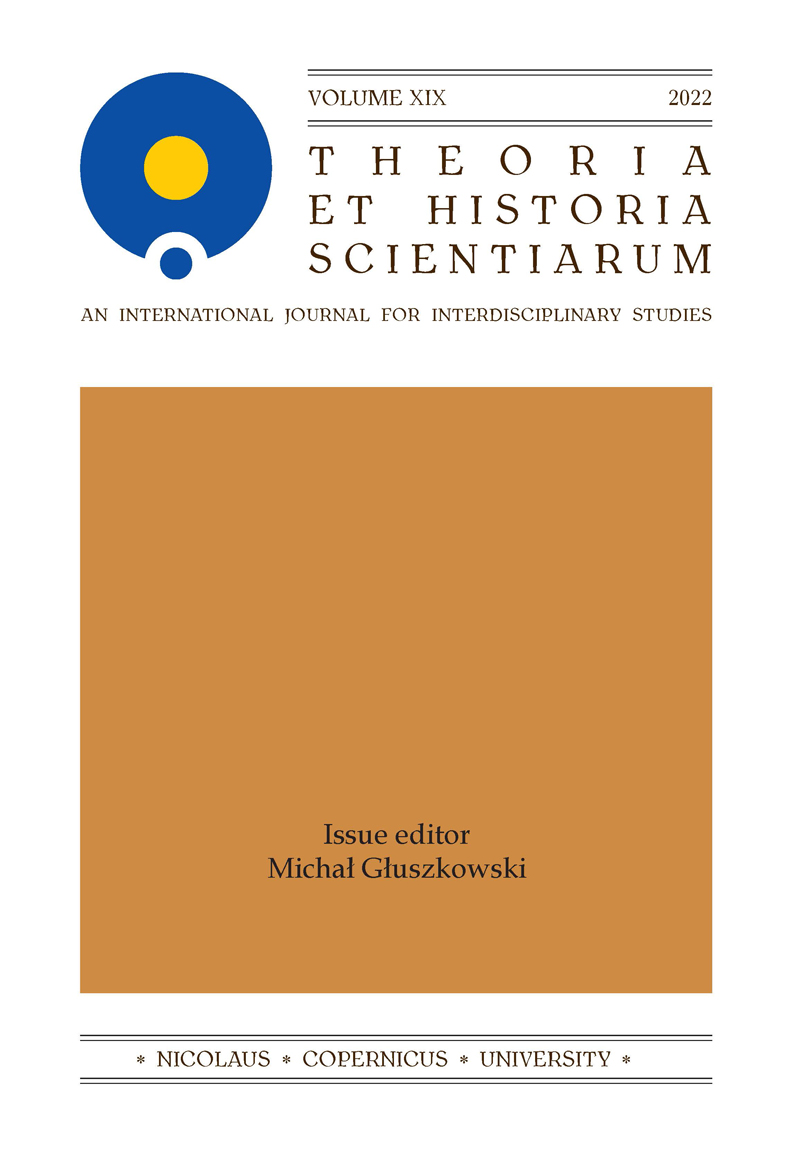Stanisław Lem’s language thinking in the space of the writer’s aphoristicon
DOI:
https://doi.org/10.12775/ths.2022.005Keywords
aphorism, discourse, live speech, ego-text, language thinkingAbstract
In this research, Stanisław Lem’s aphoristicon analysis was carried out in the view of the multifaceted classification and in the focus of the ego-text theory in particular. It was shown that the writer’s discourse is densely aphoristic: literary statements go beyond (1) the corresponding work, (2) a certain type of personal discourse, taking into account live speech, and acquire the status of aphorism, begin
to enter into socio-cultural as well as verbal circulation, of not only Polish but also other linguistic cultures of the world thanks to translations. An attempt was made to characterize the creativity of S. Lem’s language thinking which is manifested in the ability to concentrate and concisely verbalize deep thoughts on a wide range of topics and issues.
References
Areniev, V. (2021). Mandrivni dervishi u poshukakh Lema. Yakym buv naividomishyi polskyi fantast. https://chytomo.com/mandrivni-dervishi-v-poshukakh-lema/ [(11.06.2021].).
Barakatova, N. A. (2015). Strukturno-semantychna spetsyfika suchasnoi ukrainskoi aforystyky. Ukrainskyi smysl, № 1, 6–9.
Buinytska, T. O. (1996). Movnostylistychna struktura aforyzmiv E. Kanetti. Inozemna filolohiia. Respublikanskyi mizhvidomchyi zbirnyk, Lviv, № 109, 511–52.
Buts, N. V. (2004). Leksyko-semantychna klasyfikatsiia aforyzmiv u kartyni svitu Liny Kostenko. Kultura narodov Prychernomoria, Symferopol, tom 1 / № 49, 216–219. http://librar.org.ua/sections_load.php?s=philology&id=1425 [(25.07.2021].).
Citaty i aforizmy Stanislava Lema. https://citaty.su/citaty-i-vyskazyvaniya-stanislava- lema [(25.09.2021].).
Citaty iz knigi «Solyaris» Stanislava Lema – luchshie aforizmy, vyskazyvaniya i krylatye frazy. https://mybook.ru/author/stanislav-lem/solyaris/citations/ [(16.07.2021].).
Dmitrieva, O. A. (1997). Kul’turno-yazykovye xarakteristiki poslovic i aforizmov (na materiale franc. i rus. yazykov): diss. … kand. filol. nauk, Volgograd 1997. 189 s.
Fedorenko, N. T., Sokol’skaya, L. V. (1990). Aforistika, Moskva: Nauka, 419 s. Horokhovych, A. (1980). Poetyka Lesi Ukrainky i yii aforyzmy, Vinnipeg: Instytut Doslidiv Volyni. 1980. 145 s.
Hulidova, I. S. (2013). Strukturno-semantychni osoblyvosti aforyzmiv amerykanskykh poetychnykh tekstiv ХХ st. Visnyk Luhanskoho natsionalnoho universytetu im. T. Shevchenka, № 14 (273), 134–135.
Jarosiński, Z. (1998). Prose of a personal document. Disputed figures of Polish contempo- rary literature, Warszawa, 143–153.
Kalashnyk, V. S. (1992). Ukrainska poetychna frazeolohiia i aforystyka poetychnoi movy pozhovtnevoho periodu. Semantyko-typolohichnyi aspekt: avtoref. dys. … d-ra filol. nauk, Dnipropetrovsk. 40 s.
Kalashnyk, V. S. (2011). Liudyna ta obraz u sviti movy: vybrani statti. Kharkiv: KhNU imeni V. N. Karazina. 368 s.
Karasik, V. I. (2000). O tipax diskursa. Yazykovaya lichnost’: institucional’nyj i personal’nyj diskurs: sb. nauch. tr., Volgograd: Peremena, 2000, 5–20.
Kita, M. (2013). Polish privacy discourse. Polish Postscriptum., No. 1 (11), 93–103. Koloiz, Zh. V. (2016). Movna hra yak vyiav kreatyvnosti v suchasnii aforystytsi.
Filolohichni studii: Naukovyi visnyk Kryvorizkoho derzhavnoho pedahohichnoho universytetu: zb. nauk. prats, vyp. 15, 163–185.
Kosmeda, T. A. (2012). Ego i Alter Ego Tarasa Shevchenka v komunikatyvnomu prostori shchodennykovoho dyskursu, Drohobych: Kolo, 372 s.
Kosmeda, T. A. (2019). Linhvokreatyvnist S. I. Doroshenka v modeliuvanni ego- tekstiv: zhanr vinshuvannia-pryvitannia-prysviaty. Linhvistychni doslidzhennia: zb. nauk. prats Kharkivskoho natsionalnoho pedahohichnoho universytetu im. H. S. Skovorody, vyp. 50, 7–17.
Kovalenko, H. P. (2010). Metody analizu i syntezu aforyzmiv ta yikh zastosuvannia, Sumy: Universytetska knyha. 798 s.
Krupko, O. I. (2010). Shchodennyi trud sertsia (Zolotoslov Tarasa Hryhorovycha Shevchenka). Problemy semantyky slova, rechennia ta tekstu, vyp. 25, 183–194.
Lem, S. «Ia zrobyv use, shcho vvazhav naiholovnishym…». https://zn.ua/ukr/SOCIUM/ stanislav_lem_ya_zrobiv_use,_scho_vvazhav_naygolovnishim.html [(17.08.2021].).
Lem, S. (2021). Moj vzglyad na literaturu. https://www.livelib.ru/book/1000322202-moj- vzglyad-na-literaturu-stanislav-lem [(08.09.2021].).
Lem, Stanyslav. Materialy z vikitsytatnyka. https://ru.wikiquote.org/wiki/Stanislav Lem [(01.09.2021].).
Lemovi lemy: Kolotnechi z pryvodu vsesvitnoho tiazhinnia; Tak kazav Lem. Zi Stanislavom Lemom rozmovliaie Stanislav Beres «Knyha skarh i propozytsii». https://chytomo. com/stanislav-lem-pro-nashchadkiv-nauku-i-tvorchist/ [(07.06.2021].).
Lomteva, T. N., Patrusheva, E. V. (2010). K voprosu o funkcional’no-pragmaticheskix aspektax aforizmov. Izvestiya Yuzhnogo federal’nogo universiteta. Filologicheskie nauki, № 2, 81–83.
Lubas-Bartoszyńska, R. (2006). Newer theoretical problems of writing about oneself: an example of statements by Polish autobiographical writers of recent decades. Przestrzenie Teorii, No. 6, 51–67.
Lysenko, N. O. (2014). Analiz zasobiv budovy suchasnykh aforyzmiv. Anhlistyka ta ame- rykanistyka, vyp. 11, 18–21.
Mixeev, M. Yu. (2007). Dnevnik kak e’go-tekst (Rossiya, XІX–XX). Moskva: Vodolej Publishers 2007. 264 s.
Paniv, L. (2010). Semantychna typolohiia aforyzmiv (na materiali suchasnoho khudo- zhnoho dyskursu). Molod i rynok. Shchomisiachnyi naukovo-pedahohichnyi zhurnal, № 10, 150–153.
Sharmanova, N. M. (2005). Ukrainska aforystyka: strukturno-semantychnyi ta funktsio- nalnyi aspekty: dys kand. filol. nauk, Kryvyi Rih 2005, 230 s.
Skurativskyi, V. (2001). Aforyzm kolys i sohodni. Aforystyka (100 maistriv ukrainskoi aforystyky). Kyiv: Prosvita. 2001. 320 s.
Stetsyk, M. S. (2012). „Korotko – yak diahnoz” (henetychni osoblyvosti aforyzmiv u romani Liny Kostenko „Zapysky ukrainskoho samashedshoho”). Molod i rynok. Shchomisiachnyi naukovo-pedahohichnyi zhurnal, № 9, 104–108.
Downloads
Published
How to Cite
Issue
Section
License
Copyright (c) 2022 Tetyana Kosmeda

This work is licensed under a Creative Commons Attribution-NoDerivatives 4.0 International License.
Stats
Number of views and downloads: 505
Number of citations: 0



